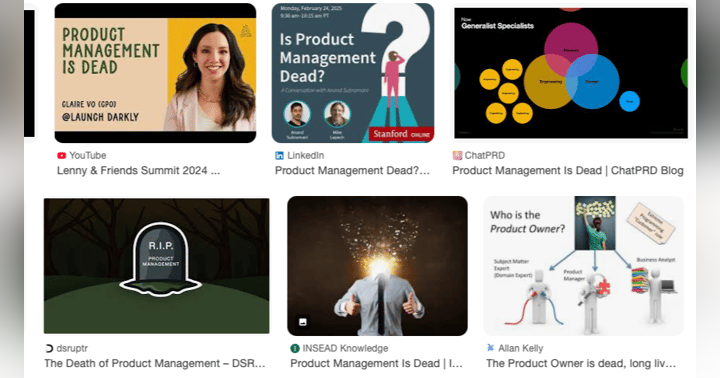CEO of the Product - A conversation with Al Zollar, Board Member IBM, NASDAQ, BNY

This weekend edition of the Product Leader's Journey newsletter contains lightly-edited excerpts of a conversation with Al Zollar , Board Member IBM , Nasdaq , BNY in Season 2 of the podcast. Al had a distinguished career of over 34 years at IBM, during which he led significant businesses as GM of IBM Tivoli, GM of the IBM AS400 (iSeries), President of IBM Lotus Software. Al spent the first 9 years of his tenure at IBM in various pre-sales and post-sales engineering roles, before becoming Product Manager for DB2, and later Product Manager for OS/2.
Product Leader's Journey is a podcast and newsletter that curates stories and lessons from senior B2B enterprise leaders about their journey of building great products, scaling the business and leading inspired teams.
Al, 34 years at IBM. I don't imagine that when you joined the company, that you thought you would be there for 30 plus years.
Al: No, I never thought I'd be there 34 years. I was just really in need of a job.
So I've tended to keep my focus on really what was ahead of me. I was fortunate to join a company like IBM, where the opportunities that they were able to present to me were manifold.
After 9 years in customer facing roles you moved into the Product Manager role for DB2. At that time in the DB2 engineering team, IBM had a lot of PhDs. How did you establish your credibility with these PhD engineers?
Al: It was an interesting time. First off, I was younger than most of them and I had never really been a developer of code. In terms of technical depth around the product like DB2, the predicate calculus and relational model, and the buffering and caching algorithms, I had no chance of trying to keep up with these incredible engineers.
But what I had that they didn't have was an understanding of how these products really operated in the client use cases in the customer's office.
I tried to bring that to the table as I managed these incredibly talented group of engineers.
How did you assert your leadership over the direction of the DB2 product without having any direct org chart or line responsibilities?
Al: That was quite an experience. The definition of Product Manager in that configuration was the product management team as well as the engineering team were the only teams that actually directly reported to me. The salespeople didn't report to me. The customer success people doing the level one, level two support didn't report to me.
Nobody said Al, you are the CEO of DB2. So, this was a mindset that you adopted. There is a debate about whether the Product Manager is the CEO of the Product or not. And to hear you say from your own experience that you saw yourself as the CEO of DB2 Incorporated is wonderful.
Al: I didn't call myself the CEO initially. In fact,
When I talked about "DB2 Incorporated", I wanted people to think about ourselves as if we were a self-contained company trying to make this product successful in the eyes of our customers and against competitors.
How did you define and drive forward vision, strategy, and execution in the market?
Al: It was an evolution. It wasn't something I had day one managing DB2, but it evolved to the belief that there are incredible markets that we get to serve.
There are four things that you have to be clear on to be successful in a product business as a Product Manager, as a Product Leader.
- The first is truly understanding, as best as you can, the Target Addressable Market, or TAM.
- The second thing to understand are what are the priorities that customers have to make them respond to your value proposition compared to the value proposition of a competitive or substitute product. What is it about your capabilities, your product, your solution and offering that makes customers allow them to exchange their money for your product?
- The third thing that's very important is the business model that is sustainable in terms of the way that you capture that revenue, that value from customers.
- And the last part is the financial model. What is the multi-year growth in terms of revenue, and how do you manage expenses so that you can deliver profitable growth?
If you really learn how to be rigorous and deep in those four dimensions of products, that's how I think you can be most successful.
Did you have any opportunity to experience any tension between product and engineering even though both functions reported into you?
Al: Yes, I have a very clear recollection of two individuals, when I was managing the Tivoli business, who were just at open warfare with each other. It got to the point where it spilled into the organization. I had to intervene.
I called both of them into my office and I said this has got to stop. You have to figure out how to work as colleagues, and if it doesn't stop, I can guarantee you one thing, one of us will not be here the next time we talk about it.
Now I told them, I don't know if that person who won't be here is you, you or me, but I guarantee one of us won't be here. I'm going to ask you guys to figure this out. I'm going to help where I'm available for help, wherever you need it.
But that actually improved the situation. I doubt these individuals became buddies, but they became much more effective in front of the organization and showed the kind of teamwork that you have to show. That was a moment.
It's a great takeaway that you included and made yourself vulnerable in that situation.
Al: What I really meant by that is that I could be fired, or I would quit. We were not in a sustainable situation.
Tough conversations over 34 years. I'm sure you've had your share of them. How do you approach a tough conversation?
Al: The simplest way to do it is through empathy, whether it's an employee that had to separate from the business or a customer had to deliver a hard message.
Just try to live in their shoes so that you can understand how they will react to what they will perceive as bad news and just be human. We all want to do good things in these kind of environments. Again, some people may have different motives, but you have to keep in mind the humanity and dignity of people that you're dealing with when there's bad news to be delivered.
How do you keep yourself learning?
Al: It goes back to curiosity. I try to build relationships with really smart people.
One of my bosses said, "Al you don't have to be a walking encyclopedia, as long as you are a walking index."
I try to maintain pointers to all these smart people who I can learn from.
You've been writing with the hashtag #newwhitemen. Tell us about that.
Al: Yeah, that's an interesting one, Rahul. Post the murder of George Floyd, I think a lot of people felt the need, and I certainly did, to express things that had been on their hearts. I've been fortunate to work in C-suites and boardrooms with a lot of people. Not surprisingly, the vast majority of those people were white men. There were some white women as well and women of color and other people of color, but you could say white men were overrepresented compared to their place in the population.
I noticed that when it came to the subject of diversity, equity and inclusion, there were two kind of white men. There were old white men and new white men, and that's not a statement of chronological age. It's a statement of mindset.
The old white men were the kind of folks who didn't have much to say, looked at their watches to see when this would be over, really were not comfortable, in my eyes, with the topic of inclusive environment.
The new white men, on the other hand, were people who leaned in, who treated it the way you would treat any business topic. What does the data show? What does the trend show? What does the outside world show relative to what we're doing here? And they were part of the discussion.
It just occurred to me that we need allyship with these new white men if we're ever going to eradicate racism in the United States and certainly globally. So I wrote a challenge to all of the white male colleagues I'd worked with. This is not to exclude people of color or white women, who've been great allies, but to invite all the white men that I worked with to jump on the train to be a new white man and to begin the journey of really trying to understand the lived experiences of people who are actually the majority of people who are on the planet. White men are not the majority of people on the planet. For those who engage in that way, they actually, I think, find new opportunities and new insights that are valuable to them personally and professionally.
That's tremendous and a beautiful message. This is a conversation that, to me, feels like it should never end. I'm deeply grateful and honored to have you on Product Leader's Journey. Thank you.
Al: Rahul, thank you for inviting me to have this discussion. It's really been a great discussion and if anything I've said benefits someone, then it is more than time well spent. So, thank you for having me.
You can watch the full conversation between Rahul Abhyankar and Al Zollar on YouTube, and listen on Apple Podcasts and Spotify. Al shares more stories, talks about the obligations of being a Board member, organizational culture, and also dives into IBM's efforts with AI.








